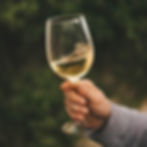All the while that my dad’s doctors were relying on their vast medical knowledge and skills to save his life, my father was self-prescribing.

“You think they’ll say I can have a glass of wine now and then?”
I remembered this poignant, often-repeated question of my father’s as I came to pick him up and drive him home from a gathering of his Italian club. For half a year it had lingered in my mind like the aftertaste of an unforgettable vintage. And now, as Dad finished his meal and introduced me to a few of his newly made friends, I noticed his glass, nearly empty, the last mouthful of pinot grigio calling to be savored. Despite the social distractions, my thoughts reeled back to a time just six months earlier when I doubted that my dad would live to share another meal again.
He was 80 and in the hospital for emergency open-heart surgery. His cardiologist and cardiac surgeon debated the necessity vs. futility of doing such an extensive invasive procedure on someone his age. After all, his surgeon argued, should they be wasting their time and effort trying to save someone who probably had only a few years left? His cardiologist argued emphatically for treatment. He knew my father much better than the surgeon did. To him, Dad was a vibrant individual, and he asserted that no matter how much longer my father might live, he deserved a chance at extending his quality of life. My dad knew the risks and had an advance directive that said if he didn’t have a decent shot at maintaining his life the way he wanted to live it, he was willing to let go. The cardiologist supported the decision to opt for quality over quantity.
During that 12-week ordeal, my father was in intensive care more than half that time, on a respirator on three separate occasions, and went into congestive heart failure twice and cardiopulmonary arrest once. And yet here he was, six months later, laughing and joking and sipping the last drop of Italian wine.
You see, all the while that my dad’s doctors were relying on their vast medical knowledge and skills to save his life, my father was self-prescribing. I understood him completely. His need for occasional wine was not alcoholic but spiritual. Wine took him back to his identity, to the roots of his Abruzzo homeland and to his years in New York City, when every autumn our family would make our own wine. First-press. No additives. Pure. As Dad slowly got stronger, he was telling me by his repeated question exactly what would be healing to his soul. He wanted to feel autonomous and whole again. Would the doctors understand? Each “We’ll see” from me was like a big pill he had to swallow or injection to endure.
To the credit of my father’s surgeon, cardiologist, pulmonologist, and internist, they took a holistic approach, each at the appropriate time giving their consent for moderate consumption of wine, along with recommendations that he sing and walk and putter in the garden and participate in all the other activities in life they knew mattered to him. He took their advice and lived another five active, highly engaged years that brought joy and the benefits of his wisdom to everyone around him.
The physicians’ person-centered prescriptions renewed my father’s faith in his own power to heal. They renewed my faith in the enlightened direction it’s possible for modern medicine to take. For when science and spirituality are joined in the service of healing an elder’s body and honoring an elder’s soul, there is no more potent protocol humanity can devise.
Except maybe an occasional glass of good Italian wine.
_______________________________________________________________________________________________________
Article originally published at changingaging.org.
